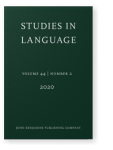Vol. 44:2 (2020) ► pp.407–460
Indefinite expressions and accessibility hierarchy to core argument functions in a sample of Austronesian languages (and beyond)
In many languages, indefinite expressions are known to have restricted access to core argument functions. This article focuses on the accessibility hierarchy of indefinite expressions to subject and object functions in a sample of Austronesian languages. Aiming at some comparative analysis, some cross-linguistic perspectives on the differential encoding of ± definite core arguments and other types of restrictions are discussed. The questions addressed are: (i) What type of indefinite nouns have core argument function? (ii) If barred from core argument function, how are indefinite arguments circumvented? (iii) Does existence or lack of indefinite articles correlate with access to core argument function, and in what way?
In Austronesian languages, one finding is that languages with indefinite articles display fewer restrictions on the access of indefinite NPs to core argument function. Another finding is that differences of definiteness, individuation and specificity of arguments tend to be expressed by distinct domains: the noun phrase in languages with indefinite articles, the verb phrase in languages without indefinite articles (via valency, voice alternations, alignment changes), with an intermediate situation in some Micronesian languages.
Article outline
-
1.Introduction
- 1.1The sample
- 1.2The aims
- 2.Defining indefiniteness, specificity and genericity
- 2.1Definiteness and indefiniteness
- 2.2Specific and non-specific indefinite NPs
- 2.3Generic NPs
- 3.Indefinite NPs and restrictions on argument function
- 3.1Cross-linguistic perspectives on the differential encoding of ± definite core arguments
- 3.1.1Differential object case-marking and ‘deobjectivisation’
- 3.1.2Differential subject case-marking and ‘desubjectivisation’
- 3.1.3Word order and patterns of subject agreement
- 3.1.4Incorporation of indefinite arguments
- 3.1.5Languages with articles: Existential and stage-framing constructions
- 3.2Constraints on indefinite subjects and existential predications
- 3.3Austronesian-Oceanic languages
- 3.1Cross-linguistic perspectives on the differential encoding of ± definite core arguments
- 4.Restrictions of access to subject function in languages with and without indefinite articles
- 4.1Access to subject function in languages without indefinite articles
- 4.1.1Constraints on indefinite subjects and existential predications
- 4.2Access to subject function in languages with ± specific indefinite articles
- 4.2.1Maori: Argument function accessibility of indefinite nouns
- 4.2.1.1Thetic event sentences and episodic sentences
- 4.2.1.2Event-denoting, episodic sentences with transitive and intransitive verbs
- 4.2.1.2.1Subject accessibility: tētahi NPs only
- 4.2.1.2.2Subject accessibility: tētahi and he NPs
- 4.2.1.2.3Subject accessibility of passive verbs: tētahi and he NPs
- 4.2.2Mavea (Vanuatu)
- 4.2.1Maori: Argument function accessibility of indefinite nouns
- 4.1Access to subject function in languages without indefinite articles
- 5.Access to object function
- 5.1Languages without indefinite articles: Access to object function
- 5.1.1Nêlêmwa
- 5.1.2Access to object function in languages with or without articles and with semi-transitive constructions
- 5.1.2.1Saliba
- 5.1.2.2Trukese and Marshallese (Micronesian)
- 5.2Languages with indefinite articles: Access to object function
- 5.2.1Maori: Accessibility to object function
- 5.2.2Access to object function in Biak (Eastern Malayo-Polynesian)
- 5.2.3Access to object function in Mavea (Vanuatu)
- 5.1Languages without indefinite articles: Access to object function
- 6.Access of generic expressions to argument function
- 6.1Generic expressions and subjecthood in Nêlêmwa
- 6.2Generic NPs in Maori
- 6.3Generic NPs in Biak and Mavea
- 6.3.1Generic NPs in Mavea
- 6.3.2Summary of Section 6
- 7.Accessibility hierarchy in Western Austronesian
- 7.1Thetic, existential predications in Northern Amis
- 7.1.1Event existentials: Elision of non-specific actor subjects
- 7.1.2Event existentials: Elision of non-specific undergoer subjects
- 7.2Voice alternations: Avoiding indefinite subjects in Northern Amis
- 7.3Voice alternations: Avoiding indefinite arguments in Tagalog
- 7.3.1Existential predications in Tagalog
- 7.3.2Indefinite patients in Tagalog
- 7.3.3Oblique indefinite patients of non-factive verbs
- 7.4Existential predications in Kapampangan (Philippines)
- 7.1Thetic, existential predications in Northern Amis
- 8.Conclusion
- Acknowledgments
- Notes
- Abbreviations
-
References
